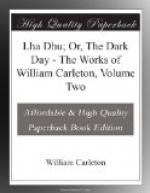“Poor girl, put
on thy stifling widow’s weeds,
And ’scape at
once from Hope’s accursed bands!”
We feel utterly incapable of describing, during the progress of this heavy night, the scorching and fiery anguish of his brother Hugh, or the distracted and wailing sorrow of poor Maura. The unexpected and delightful revulsion of feeling produced upon both, especially on the former, by his temporary recovery, now utterly incapacitated them from bearing his relapse with anything like fortitude. The frantic remorse of the guilty man, and the stupid but pungent grief of his sister, appeared but as the symptoms of weak minds and strong passions, when contrasted with the deep but patient affliction of his innocent and uncomplaining wife. She wasted no words in sorrow; for during this hopeless night, self, happiness, affection, hope, were all forgotten in the absorbing efforts at his recovery. Never, indeed, did the miseries and calamities of life draw from the fruitful source of a wife’s attached and faithful heart, a nobler specimen of that pure and disinterested devotion which characterizes woman, than was exhibited by the stricken-hearted Alley Bawn.
There was something in this peculiar case, as, indeed there are in all family occurrences of a similar nature, which induced them to try upon the suffering boy the full extent of their humble skill, rather than call in a strange physician to witness the disastrous, perhaps fatal, effects of domestic violence. Had the cause of Felix’s illness been unknown to Hugh or Maura, they would have procured medical advice in the early part of the night. Let us, however, not press too severely on the repentant brother. Shame, and remorse, and penitence, ought to plead strongly for “the hope deferred that made his heart sick.” Hugh’s passions arose to violence, but not to murder, a distraction which both law and morality too frequently forget to make.




